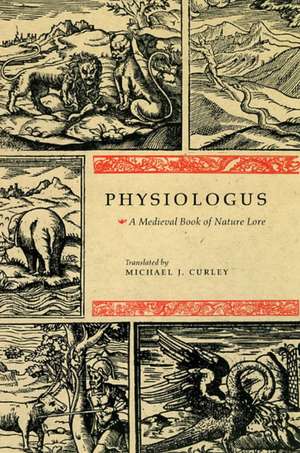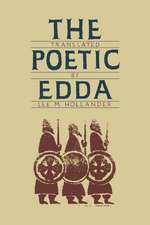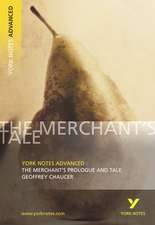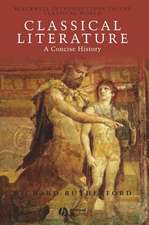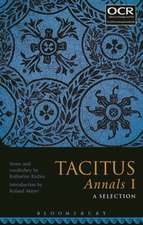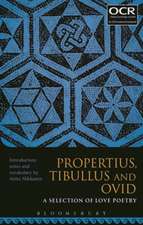Physiologus: A Medieval Book of Nature Lore
Traducere de Michael J. Curleyen Limba Engleză Paperback – 15 sep 2009
One of the most popular and widely read books of the Middle Ages, Physiologus contains allegories of beasts, stones, and trees both real and imaginary, infused by their anonymous author with the spirit of Christian moral and mystical teaching. Accompanied by an introduction that explains the origins, history, and literary value of this curious text, this volume also reproduces twenty woodcuts from the 1587 version. Originally composed in the fourth century in Greek, and translated into dozens of versions through the centuries, Physiologus will delight readers with its ancient tales of ant-lions, centaurs, and hedgehogs—and their allegorical significance.
“An elegant little book . . . still diverting to look at today. . . . The woodcuts reproduced from the 1587 Rome edition are alone worth the price of the book.”—Raymond A. Sokolov, New York Times Book Review
“An elegant little book . . . still diverting to look at today. . . . The woodcuts reproduced from the 1587 Rome edition are alone worth the price of the book.”—Raymond A. Sokolov, New York Times Book Review
Preț: 175.19 lei
Nou
Puncte Express: 263
Preț estimativ în valută:
33.53€ • 36.44$ • 28.19£
33.53€ • 36.44$ • 28.19£
Carte disponibilă
Livrare economică 31 martie-14 aprilie
Livrare express 14-20 martie pentru 16.81 lei
Preluare comenzi: 021 569.72.76
Specificații
ISBN-13: 9780226128702
ISBN-10: 0226128709
Pagini: 144
Ilustrații: 20 line drawings
Dimensiuni: 140 x 216 x 10 mm
Greutate: 0.18 kg
Ediția:Second Edition
Editura: University of Chicago Press
Colecția University of Chicago Press
ISBN-10: 0226128709
Pagini: 144
Ilustrații: 20 line drawings
Dimensiuni: 140 x 216 x 10 mm
Greutate: 0.18 kg
Ediția:Second Edition
Editura: University of Chicago Press
Colecția University of Chicago Press
Notă biografică
Michael J. Curley is professor emeritus of English at the University of Puget Sound. He is the author of many books, including Alessandro Manzoni: Two Plays.
Cuprins
Introduction
I. We begin first of all by speaking of the Lion
II. On the Antelope
III. On Piroboli Rocks
IV. On the Swordfish
V. On the Charadrius
VI. On the Pelican
VII. On the Owl
VIII. On the Eagle
IX. On the Phoenix
X. On the Hoopoe
XI. On the Wild Ass
XII. On the Viper
XIII. On the Serpent
XIV. On the Ant
XV. On the Siren and Ass-Centaur
XVI. On the Hedgehog
XVII. On the Ibis
XVIII. On the Fox
XIX. On the Peridexion Tree and the Doves
XX. On the Elephant
XXI. On Amos the Prophet
XXII. On the Roe
XXIII. On the Agate-stone
XXIV. On the Oyster-stone and the Pearl
XXV. On the Adamant-stone
XXVI. On the Other Nature of the Wild Ass and the Monkey
XXVII. On the Indian-stone
XXVIII. On the Heron, that is, the Coot
XXIX. On the Fig Tree
XXX. On the Panther
XXXI. On the Whale, that is, the Aspidoceleon
XXXII. On the Partridge
XXXIII. On the Vulture
XXXIV. On the Ant-lion
XXXV. On the Weasel
XXXVI. On the Unicorn
XXXVII. On the Beaver
XXXVIII. On the Hyena or the Brute
XXXIX. On the Niluus
XL. On the Echinemon
XLI. On the Little Crow
XLII. On the Ostrich
XLIII. On the Turtle-dove
XLIV. On the Swallow
XLV. On the Stag
XLVI. On the Frog
XLVII. On the Lizard, that is, the Salamander
XLVIII. On the Magnet
XLIX. On the Adamant-stone
L. On the Doves
LI. On the Sun-lizard, that is, the Sun-eel
Notes
I. We begin first of all by speaking of the Lion
II. On the Antelope
III. On Piroboli Rocks
IV. On the Swordfish
V. On the Charadrius
VI. On the Pelican
VII. On the Owl
VIII. On the Eagle
IX. On the Phoenix
X. On the Hoopoe
XI. On the Wild Ass
XII. On the Viper
XIII. On the Serpent
XIV. On the Ant
XV. On the Siren and Ass-Centaur
XVI. On the Hedgehog
XVII. On the Ibis
XVIII. On the Fox
XIX. On the Peridexion Tree and the Doves
XX. On the Elephant
XXI. On Amos the Prophet
XXII. On the Roe
XXIII. On the Agate-stone
XXIV. On the Oyster-stone and the Pearl
XXV. On the Adamant-stone
XXVI. On the Other Nature of the Wild Ass and the Monkey
XXVII. On the Indian-stone
XXVIII. On the Heron, that is, the Coot
XXIX. On the Fig Tree
XXX. On the Panther
XXXI. On the Whale, that is, the Aspidoceleon
XXXII. On the Partridge
XXXIII. On the Vulture
XXXIV. On the Ant-lion
XXXV. On the Weasel
XXXVI. On the Unicorn
XXXVII. On the Beaver
XXXVIII. On the Hyena or the Brute
XXXIX. On the Niluus
XL. On the Echinemon
XLI. On the Little Crow
XLII. On the Ostrich
XLIII. On the Turtle-dove
XLIV. On the Swallow
XLV. On the Stag
XLVI. On the Frog
XLVII. On the Lizard, that is, the Salamander
XLVIII. On the Magnet
XLIX. On the Adamant-stone
L. On the Doves
LI. On the Sun-lizard, that is, the Sun-eel
Notes
